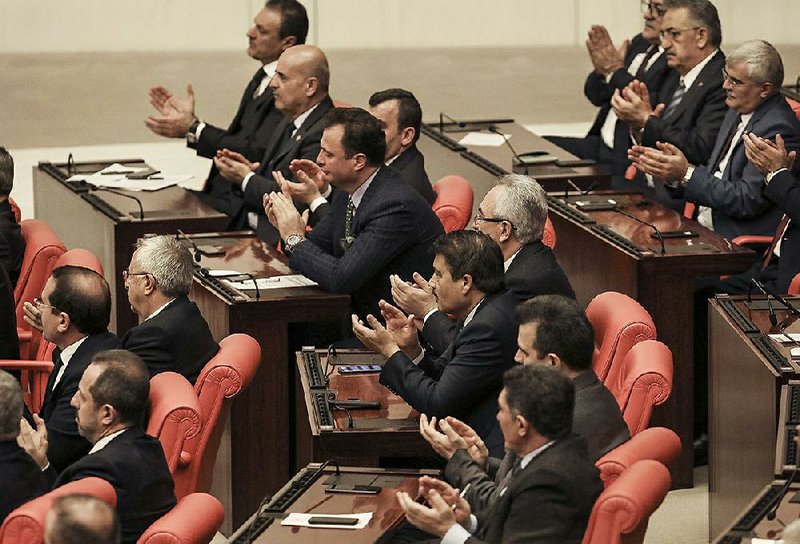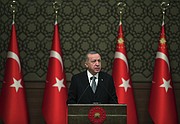ANKARA, Turkey -- Turkey's parliament on Thursday authorized the deployment of troops to Libya to support the U.N.-backed government in Tripoli that is battling forces loyal to a rival government seeking to capture the capital.
Turkish lawmakers voted 325-184 at an emergency session in favor of a one-year mandate allowing the government to dispatch troops over concerns that Turkish forces could aggravate the conflict in Libya and destabilize the region.
The Tripoli government of Prime Minister Fayez Sarraj has faced an offensive by the rival regime in the east and forces loyal to commander Gen. Khalifa Hifter. The fighting has threatened to plunge Libya into violent chaos rivaling the 2011 conflict that ousted and killed longtime dictator Moammar Gadhafi.
Meanwhile, Libya's forces in the country's east say they have called on citizens to take up arms against Turkish troops if they deploy to fight against them.
[Gallery not loading above? Click here for more photos » arkansasonline.com/13turkey/]
In a statement Thursday on Twitter, the self-styled Libya National Army led by Hifter said that it was the people's "duty" to fight to protect the homeland. Libya's authorities in the east have several times throughout the war encouraged its citizens to take up arms and volunteer for police or military forces.
Turkish President Recep Tayyip Erdogan said last month that Sarraj requested the Turkish deployment after he and Sarraj signed a deal that allows Ankara to dispatch military experts and personnel to Libya. That deal, along with a separate agreement on maritime boundaries between Turkey and Libya, has led to anger across the region and beyond.
Ankara says the deployment is vital for Turkey to safeguard its interests in Libya and in the eastern Mediterranean, where it finds itself increasingly isolated as Greece, Cyprus, Egypt and Israel have established exclusive economic zones paving the way for oil and gas exploration.
"A Libya whose legal government is under threat can spread instability to Turkey," ruling party legislator Ismet Yilmaz argued in defense of the motion. "Those who shy away from taking steps on grounds that there is a risk will throw our children into a greater danger."
The government has not revealed details about the possible Turkish deployment. The motion allows the government to decide on the scope, amount and timing of any mission.
Erdogan and U.S. President Donald Trump held a telephone conversation and discussed the situation in Syria and in Libya, the Turkish president's office said soon after the vote. A brief statement said they discussed "the importance of diplomacy in solving regional issues."
Coming just months after mounting a third military incursion into Syria, the Libya gambit is the latest example of Turkey's growing self-confidence as a regional power, analysts say.
Erdogan has long held an ambition for a kind of restoration of the Ottoman Empire, reestablishing Turkey's position of leadership in the Muslim world with an expansive foreign policy.
His regional stance, in alliance with the wealthy Persian Gulf state of Qatar, has pitted Turkey against Saudi Arabia, Egypt and the United Arab Emirates. The opposing groups back rival proxy forces in Libya and Syria, and they represent a new fault line in the Middle East.
But domestic politics are also never far from Erdogan's calculations, and his geopolitical aspirations for Turkey are popular at home. The mission in Libya, part of the former Ottoman domain, fits nearly into that vision.
Egypt's Foreign Ministry condemned "in the strongest language" the Turkish parliament's authorization to deploy troops, saying Turkey would carry full responsibility for the negative effect it would have on the stability of the Mediterranean region.
Egypt, which neighbors Libya, has backed the regime in the country's east.
The leaders of Greece, Israel and Cyprus denounced the move as a "dangerous threat to regional stability" and a "dangerous escalation" of the Libyan conflict that violates U.N. resolutions and undermines international peace efforts.
"The repercussions of such a reckless move will be dire for the stability and peace of the entire region," Greek Prime Minister Kyriakos Mitsotakis, Cypriot President Nicos Anastasiades and Israeli Prime Minister Benjamin Netanyahu said in a joint statement after signing a deal for a pipeline conveying east Mediterranean gas to Europe.
"Ankara should refrain from taking such action, which blatantly violates Libyan national sovereignty and independence."
Numan Kurtulmus, deputy chairman of Turkey's ruling party, welcomed parliament's vote, telling CNN-Turk television the mandate "will ensure that the legal government in Libya remains in place and Turkey's natural rights [in the Mediterranean] are maintained."
He added that the mandate does not mean that "troops will be quickly sent tomorrow to conduct operations."
Turkish Vice President Fuat Oktay told state-run Anadolu Agency that Turkey would send "the necessary number [of troops] whenever there is a need." But he also said it would not dispatch forces if Libya's rival government halts its offensive.
Turkey's main opposition party, CHP, had vowed to vote against the motion, arguing that the deployment would embroil Turkey in another conflict and make it a party to the further "shedding of Muslim blood."
Before the vote, CHP leader Kemal Kilicdaroglu called on the government to work for the establishment of a United Nations peacekeeping force in Libya.
Kurtulmus, the ruling party official, said the mandate does not exclude a peacekeeping force. He said, however, the government believes that U.N. peacekeeping missions were not successful in ending conflicts in the past.
Two other opposition parties voted against the motion.
"We cannot throw our soldiers in the line of fire of a civilian war that has nothing to do with our national security," Aytun Ciray, a member of the opposition Good Party, said during the parliamentary debate.
However, Erdogan's ruling party is in an alliance with a nationalist party, and the two held sufficient votes for the motion to pass.
With some justification Erdogan has argued that he has security interests in both Iraq and Syria because Turkey shares a long border with both and has suffered from instability spilling over from their conflicts. With Libya he has made similar arguments, as well as historical ones.
Erdogan pointed out last week that Libya was the last of the Ottoman territories to be lost and that Turkey's founder, Mustafa Kemal Ataturk, fought and was wounded there as a young officer.
Fighting around Tripoli escalated in recent weeks after Hifter declared a "final" and decisive battle for the capital. He has the backing of the United Arab Emirates and Egypt, as well as France and Russia, while the Tripoli-based government receives aid from Turkey, Qatar and Italy.
Turkish-backed Syrian proxy fighters have already arrived in Libya, and more have assembled in training camps in Turkey ahead of deployment, according the Syrian Observatory for Human Rights, an independent monitoring organization.
The moves follow increased support this summer by Erdogan to Libya's Government of National Accord, headed by Sarraj.
Turkey sent military advisers, arms and a fleet of 20 drones to defend Tripoli from attack by Hifter's forces.
After Russia recently became involved, sending contract forces to support Hifter's offensive, Erdogan upped the ante.
Turkish assistance under the new agreement will stretch to training and capacity building, a recent paper by the European Council for Foreign Relations reported.
"It now appears that Turkey will not only defend the [Tripoli government] but influence their future security setup," it said.
Information for this article was contributed by Suzan Fraser, Menelaos Hadjicostis and Maggie Michael of The Associated Press; and by Carlotta Gall of The New York Times.
A Section on 01/03/2020

